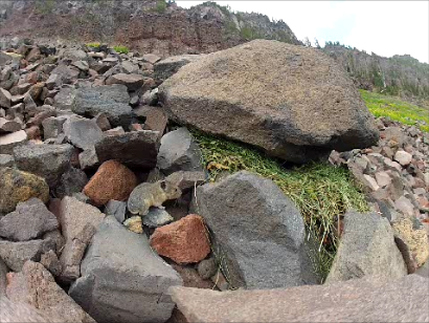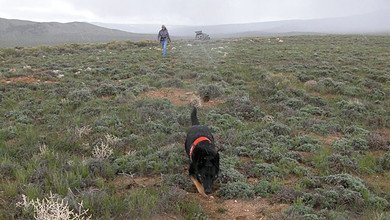Alpine Ecology & Climate Change
Currently our Alpine Ecology & Climate Change project is inactive: pending funding.
This is a pilot project to connect elementary and middle school students with field ecology, environmental detective work, and climate change. There are three educational elements:
1) classroom lessons presented by Institute staff,
2) internet lessons and resources, and
3) field experience.
Project scientists will partner with teachers and administrators at Longfellow Elementary School in Bozeman, Montana, to prepare a suite of four classroom lessons and one field trip, for fifth-grade classes. A similar effort will work with sixth grade classes at Sacajawea Middle School. This project provides a real-world learning experience for children that can transform their understanding of their place in nature and encourage them to become engaged in their community to help solve environmental problems. This is a partnership between two conservation organizations, the Craighead Institute and Working Dogs For Conservation.
The goals of the project are:
1. To introduce students at an early age to ecological concepts such as habitat, climate, climate change, and life histories of species.
2. To integrate outdoor studies into the Montana elementary school curriculum.
3. To develop an appreciation in students of the complexity of nature and the interrelatedness of people, plants, wildlife, and the physical environment.
4. To involve students in research and conservation activities with an understanding of cause and effect relationships and why these are important.
5. To help give students the tools to think about complex issues and formulate decisions.
6. To suggest and encourage actions that students can take to effect conservation change in their own lives.
Lesson plans and materials from the pilot project will be made available, after evaluation, on the internet for use by other schools throughout Montana. These lesson plans will form a thread that weaves through the fifth grade Montana Common Core Curriculum where students apply their skills in writing, exposition, critical listening, mathematics, and problem solving. The Alpine Ecology and Climate Change lessons will reinforce Common Core teachings, and Common Core exercises will reinforce material learned in the lessons. A web site with lesson supplements will be set up for students to access for homework assignments. Videos of scientists at work, and conservation dogs searching for clues will be provided; these videos will be produced during the field work phase of the project. A homework assignment for each lesson will require students to view online material and use internet links to other sources of information in order to answer questions. Facets of alpine ecology and/or climate change can be used by students in writing, presentation, and mathematical exercises.
Craighead Institute staff will develop draft lesson plans and web sites. The materials will be fine-tuned by collaborating with teachers so that the concepts presented can accommodate Montana Common Core requirements. Teachers can help determine how much material can be included in each lesson, when during the school year the classes can be taught, what homework assignments can reinforce Common Core teachings, and when the field trips can be planned.
Students will be exposed to a unique glimpse of the beauty and complexity of nature at an early age. Although most students are exposed to the outdoors in western communities, this will be a unique opportunity for most to experience nature through the eyes of ecologists. They will learn how elements of biodiversity are distributed across an ecosystem by climatic variables, and how climate and land use change can affect habitat. Children in 5th-8th grades are very interested in nature and their surroundings and in how things work. This program will give them a framework within which to understand how climate, plants, animals, and people interact and are interrelated. They are also interested in pets, and the use of a trained dog to do scientific detective work should be fascinating to them. This program will enrich their lives and help them to become good stewards of their environment, thus enriching the community as well as protecting biodiversity into the future.
1) classroom lessons presented by Institute staff,
2) internet lessons and resources, and
3) field experience.
Project scientists will partner with teachers and administrators at Longfellow Elementary School in Bozeman, Montana, to prepare a suite of four classroom lessons and one field trip, for fifth-grade classes. A similar effort will work with sixth grade classes at Sacajawea Middle School. This project provides a real-world learning experience for children that can transform their understanding of their place in nature and encourage them to become engaged in their community to help solve environmental problems. This is a partnership between two conservation organizations, the Craighead Institute and Working Dogs For Conservation.
The goals of the project are:
1. To introduce students at an early age to ecological concepts such as habitat, climate, climate change, and life histories of species.
2. To integrate outdoor studies into the Montana elementary school curriculum.
3. To develop an appreciation in students of the complexity of nature and the interrelatedness of people, plants, wildlife, and the physical environment.
4. To involve students in research and conservation activities with an understanding of cause and effect relationships and why these are important.
5. To help give students the tools to think about complex issues and formulate decisions.
6. To suggest and encourage actions that students can take to effect conservation change in their own lives.
Lesson plans and materials from the pilot project will be made available, after evaluation, on the internet for use by other schools throughout Montana. These lesson plans will form a thread that weaves through the fifth grade Montana Common Core Curriculum where students apply their skills in writing, exposition, critical listening, mathematics, and problem solving. The Alpine Ecology and Climate Change lessons will reinforce Common Core teachings, and Common Core exercises will reinforce material learned in the lessons. A web site with lesson supplements will be set up for students to access for homework assignments. Videos of scientists at work, and conservation dogs searching for clues will be provided; these videos will be produced during the field work phase of the project. A homework assignment for each lesson will require students to view online material and use internet links to other sources of information in order to answer questions. Facets of alpine ecology and/or climate change can be used by students in writing, presentation, and mathematical exercises.
Craighead Institute staff will develop draft lesson plans and web sites. The materials will be fine-tuned by collaborating with teachers so that the concepts presented can accommodate Montana Common Core requirements. Teachers can help determine how much material can be included in each lesson, when during the school year the classes can be taught, what homework assignments can reinforce Common Core teachings, and when the field trips can be planned.
Students will be exposed to a unique glimpse of the beauty and complexity of nature at an early age. Although most students are exposed to the outdoors in western communities, this will be a unique opportunity for most to experience nature through the eyes of ecologists. They will learn how elements of biodiversity are distributed across an ecosystem by climatic variables, and how climate and land use change can affect habitat. Children in 5th-8th grades are very interested in nature and their surroundings and in how things work. This program will give them a framework within which to understand how climate, plants, animals, and people interact and are interrelated. They are also interested in pets, and the use of a trained dog to do scientific detective work should be fascinating to them. This program will enrich their lives and help them to become good stewards of their environment, thus enriching the community as well as protecting biodiversity into the future.


